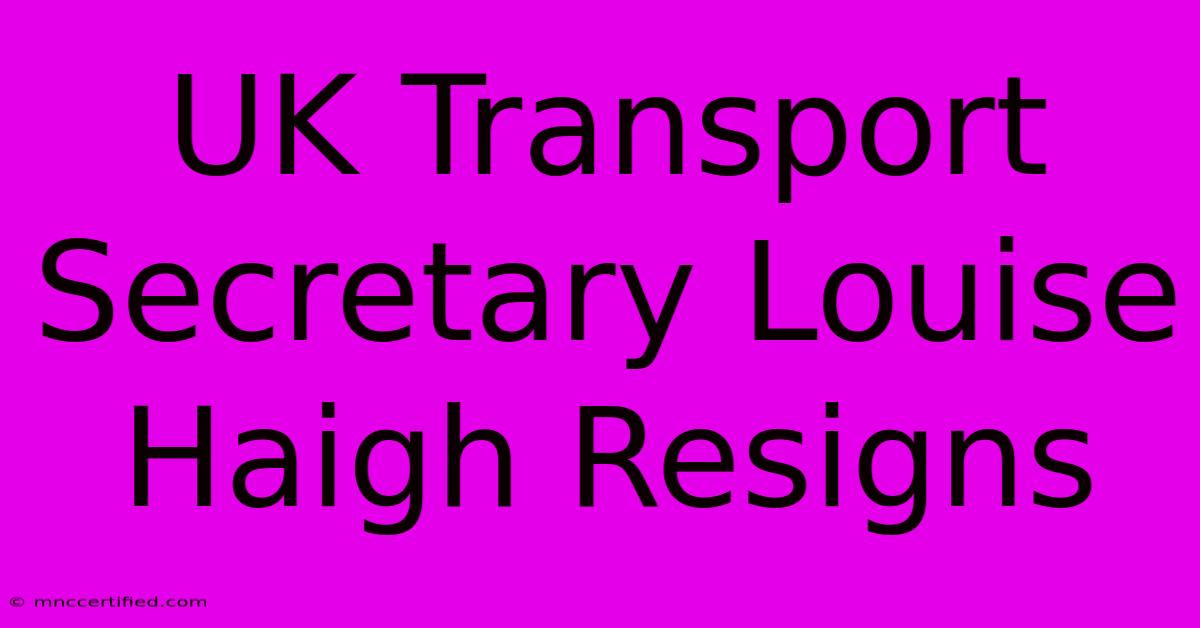UK Transport Secretary Louise Haigh Resigns

Table of Contents
UK Transport Secretary Louise Haigh Resigns: Shockwaves Across Westminster
The UK political landscape was rocked today by the surprise resignation of Transport Secretary Louise Haigh. The announcement, delivered via a short, yet impactful statement, sent ripples through Westminster and ignited a flurry of speculation about the reasons behind her departure and the implications for the government. This article delves into the details surrounding Haigh's resignation, exploring potential causes, political fallout, and what the future holds for the Department for Transport.
The Resignation Statement: A Cryptic Message?
Haigh's resignation statement, released earlier this morning, was notably brief. While thanking the Prime Minister and colleagues for the opportunity to serve, it offered little in the way of explanation for her sudden decision. The lack of detail has fueled intense speculation, with various theories circulating within political circles and across social media. The ambiguity of the statement itself has arguably heightened public interest, driving searches for more information and making this a rapidly developing news story.
Key Questions Remain Unanswered
Several key questions remain unanswered following the statement:
- What prompted her resignation? Was it a matter of principle, a disagreement over policy, or perhaps personal reasons? The lack of transparency has left many guessing.
- What are the implications for the government? A ministerial resignation always carries political weight, potentially undermining public confidence or signaling internal strife. The government's response will be crucial in managing this situation.
- Who will replace her? Speculation is already rife regarding potential successors, with several names being put forward by political analysts and commentators. The choice of replacement will provide further insights into the government's priorities and stability.
Potential Reasons Behind Haigh's Resignation: Exploring the Theories
While official reasons remain undisclosed, several potential explanations for Haigh's resignation are being considered:
- Policy disagreements: Tensions over major transport initiatives, such as HS2 or the government's approach to net-zero targets within the transport sector, could have contributed to her decision.
- Internal conflicts: Cabinet disagreements or clashes within the Department for Transport itself are also possible explanations.
- Personal reasons: It is important to remember that personal circumstances can also drive high-profile resignations. While this is often kept private, it remains a plausible factor.
- Anticipation of future events: Some speculate that Haigh may have resigned pre-emptively, anticipating unfavorable developments that could have negatively impacted her political career.
The Political Fallout: Implications for the Government and the Labour Party
The resignation's impact extends beyond the Department for Transport. It could affect the government's overall standing, potentially exacerbating existing challenges and further straining public trust. The Labour Party, while not currently in power, will also be analyzing the situation for potential political opportunities. The handling of this situation will be a key test for the Prime Minister's leadership and ability to manage crises within the government.
Looking Ahead: The Future of the Department for Transport
The immediate priority for the government will be appointing a new Transport Secretary. The choice of successor will be highly significant, offering a glimpse into the government’s priorities and signaling a potential shift in policy or approach. The selection process and the subsequent actions of the new appointee will be closely watched by the media, the public, and political rivals alike.
Keywords: Louise Haigh, Transport Secretary, resignation, UK government, Department for Transport, Westminster, political crisis, Labour Party, HS2, transport policy, net-zero, political fallout, speculation, successor.
SEO Considerations: This article utilizes a variety of keywords related to the event, aiming for a natural distribution. Header tags (H2, H3) improve readability and SEO. Internal and external linking (though external links are omitted as per instructions) would further enhance SEO. Promoting the article across social media and other online platforms is crucial for off-page optimization. Regular updates, as the situation develops, are also vital for maintaining relevance and attracting more readers.

Thank you for visiting our website wich cover about UK Transport Secretary Louise Haigh Resigns. We hope the information provided has been useful to you. Feel free to contact us if you have any questions or need further assistance. See you next time and dont miss to bookmark.
Featured Posts
-
Auto Insurance Coverage Codes
Nov 29, 2024
-
Sulaiman Praises Teams Strong Performance
Nov 29, 2024
-
Black Friday Swift Fans Camp Out At Target
Nov 29, 2024
-
Puskas Award Garnacho And Bous Goals
Nov 29, 2024
-
Unveiling The 2024 Puskas Award Nominees
Nov 29, 2024